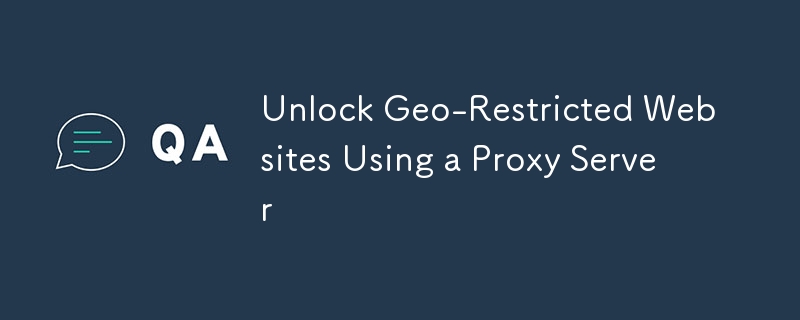

Using a proxy server to bypass regional blocking is a common and effective method. As an intermediary, the proxy server can hide the user's real IP address, making the user's request look like it comes from the geographic location of the proxy server, thereby bypassing regional blocking.
Choose a suitable proxy server: According to the network environment and blocking situation of the target area, choose a proxy server that covers the area to ensure the stability and speed of the proxy server.
Configure proxy settings: Set the address and port of the proxy server in the device or application. The configuration method may vary for different operating systems and applications, but you can usually find relevant options in the network settings or proxy settings.
Verify the proxy effect: After the configuration is completed, try to access the blocked website or service to verify whether the proxy server successfully bypasses the blockade. If you cannot access it, you may need to change the proxy server or adjust the configuration settings.
Configuring a proxy server in Python can be done in a variety of ways, including using standard libraries and third-party libraries. Here are the basic steps and code examples:
Clarify the role and requirements of the proxy server, such as hiding the real IP address, accelerating access speed, or accessing blocked websites, etc.
Set up a proxy server through urllib2.ProxyHandler. You can build a proxy Handler and use the urllib2.build_opener() method to create a custom opener object2.
Use Python's built-in socket and http.server modules, or third-party libraries such as mitmproxy or Twisted to build a custom HTTP proxy server.
Use the Flask framework to create a simple web server that uses a specified proxy to access the URL and return the response content when a request for a specific route is received.
These methods provide basic guidance for configuring and using a proxy server in Python. Depending on your specific needs, you can choose a suitable method to implement the proxy function.
To choose a suitable proxy provider, you need to pay attention to the following aspects:
Clarify whether the demand is dynamic residential proxy or static proxy. Dynamic proxy is suitable for users who frequently change IP, while static proxy is suitable for users who need long-term stable connection.
Check the quality and size of the proxy provider's IP address pool to ensure that the IP addresses are diverse and cover a wide area.
Evaluate the stability and speed of the service and choose a service provider that provides high-speed connection and low latency.
Make sure that the proxy service provider pays attention to the user's data security and privacy protection and does not record user activity logs.
Compare the prices of different proxy services and choose a cost-effective service.
In summary, choosing a suitable proxy provider requires comprehensive consideration of factors such as proxy type, service quality, security, and price.
To detect whether the proxy server is effective, there are many ways to achieve it:
Send HTTP request: Use a library such as requests to send HTTP requests, access the target website through the proxy server, and determine whether the proxy is effective based on the response status code. Status codes such as 200 usually indicate that the request is successful and the proxy is effective.
Connection test: Use telnet or socket libraries to try to connect to the IP address and port of the proxy server. If the connection is successful, the proxy is effective.
Response time test: Measure the response time of sending requests through the proxy server. Faster response time usually means better proxy performance.
Anonymity test: Visit a specific website to check the displayed IP address to confirm whether the proxy has successfully hidden the real IP address.
Use professional tools: Use specialized proxy testing tools such as ProxyChecker, which can provide more comprehensive proxy performance evaluation.
Combining the above methods, you can more accurately determine whether the proxy server is effective.
The main purposes of using a proxy server to bypass regional blocking include:
Access to restricted content: Some regions may restrict access to specific websites or services. Using a proxy server can simulate IP addresses from other regions to bypass these restrictions and access blocked content.
Privacy protection: Hiding the real IP address through a proxy server enhances the user's online privacy and security and prevents personal information from being tracked or monitored.
Cross-border e-commerce and advertising marketing: For cross-border e-commerce and advertising marketers, using a proxy server can simulate user access in different regions, understand market demand and develop targeted marketing strategies.
These scenarios show the wide application of proxy servers in bypassing regional blocking, protecting privacy and assisting business activities.
In some cases, it is legal to use a proxy server, such as for network security, privacy protection, or to access specific network resources. However, if you access restricted network resources without authorization, it may constitute an illegal act. Therefore, it is necessary to pay attention to comply with local laws and regulations when using a proxy server and avoid illegal activities. At the same time, choose a reliable proxy service provider to ensure data security and privacy protection.
The above is the detailed content of Unlock Geo-Restricted Websites Using a Proxy Server. For more information, please follow other related articles on the PHP Chinese website!




